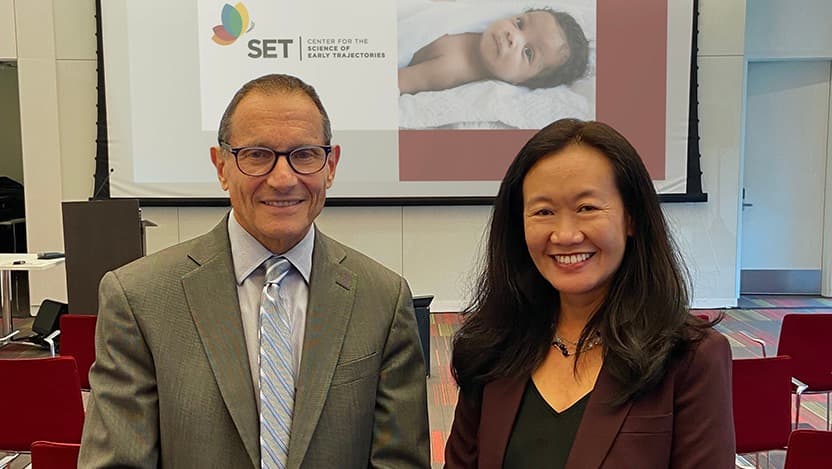UChicago Medicine launches new center to find the keys to lifelong health

The University of Chicago Medicine is launching an innovative center that will research how infant health can impact an individuals’ health throughout their lifetime. The Center for the Science of Early Trajectories (SET) will connect the University’s expertise in biological research and world-class medical care to generate best practices that improve lifelong health outcomes.
Erika Claud, MD, a neonatologist and the Director of Neonatology Research, has spent years working to help vulnerable newborn babies survive and start life as healthy as possible. She was inspired to help launch the center by the “unique crosstalk” between departments at UChicago Medicine, which allowed her to see the overlap between her work and that of other scientists and physicians caring for adults.
“Science is increasingly demonstrating that what happens to infants early in life has a lasting impact on the rest of their lives,” she said. “That led me to ask, what can be done early in life to avoid or reduce chronic diseases later in life?”
Claud’s research is focused on the microbiome, the “invisible ecosystem” of bacteria that live on and inside the human body, particularly within the gut. These bacteria perform important functions, including helping to digest food, educate the immune system, and even impact the development and function of the brain.
“As I became more involved in microbiome research, I saw that the microbiome is important for conditions across the lifespan — cancer, obesity, diabetes — and all of these patterns are set early in life,” said Claud. “I realized that infancy is not just important for infants, it’s a foundational timepoint in your life course.”
Claud could also see that beyond her own research on the microbiome, many factors that have effects on health during infancy can also impact health in adulthood. She began to think about how these diverse dimensions of health tie together.
“This center will focus on the question, ‘How do we SET up health over time?’” Claud said, expounding on the center’s acronym.
This multidisciplinary work includes a focus on the impact of health inequities and socioeconomic factors in preterm birth and infant development outcomes, including how stress and nutrition can impact lifelong development.
“Women who are under stress, whether it’s economic stress or violence or something else, are at higher risk of giving birth early and having babies that experience other long-term risks,” said Claud. “These issues begin at the earliest stages of life and can plague people their entire life. If we can understand what makes a healthy child, and what allows them to become a healthy adult, we can begin to address some health inequities.”
By identifying key timepoints and understanding what factors lead to certain health outcomes, Claud hopes that the work at SET can inform best practices and treatments to support healthy development, even in cases where socioeconomic factors can be difficult to control.
“We want to help moms and families and babies get the strongest start possible, regardless of challenges they might face due to lack of resources,” Claud said.
Research at SET will span a range of fields — from molecular analysis of patient samples from preterm and full-term infants to identify and clarify the role of the microbiome in lifelong health, to human clinical trials testing interventions to improve health in women and infants.
“The Center for the Science of Early Trajectories will link research in developmental biology, environmental science, obstetrics, pediatrics, adult medicine, microbiome science and economics in unique ways that haven’t been done before,” said Kenneth S. Polonsky, MD, Dean of the Division of the Biological Sciences and Pritzker School of Medicine. “These fields are all strengths at the University of Chicago, so some of the best minds in the world from different areas will be collaborating to tackle these complex issues in new ways. SET will not only expand our understanding of childhood development but also will help us find new ways to provide innovative patient care to produce the best possible outcomes.”
Claud said the areas served by UChicago Medicine also will benefit from the learnings and discoveries by SET collaborators.
“This work will benefit everyone, because everyone starts as a baby,” she said. “The patient population we serve on the South Side of Chicago will be at particular benefit. We’re looking for simple interventions like dietary changes or identifying key markers of inflammation or disease that indicate when someone is at high risk. Those are things that will be beneficial to our patients in real time.”
While the current pandemic has temporarily slowed the pace of clinical research outside of those involving COVID-19 or SARS-CoV-2, SET is building an infrastructure to support creation of the biorepository for patient samples and fund new research projects focused on this topic. Over time, Claud envisions the center as truly “bench-to-bedside,” incorporating all elements of the scientific process into supporting patient care.
“Our goal is to figure out when and how things change between kids who are doing well and kids who aren’t, and what factors in their environment and diet are associated with those changes,” said Claud. “We need to begin with understanding biology and environment together to determine what the best interventions are.
To learn more about the new center, visit the SET website.

Erika Claud, MD
Erika Claud, MD is a professor of pediatrics and Director of Neonatology Research. She specializes in neonatology, providing care to critically ill infants, and has an interest in the diagnosis and treatment of preterm infants and conditions of the immature digestive tract.
Learn more about Dr. Claud